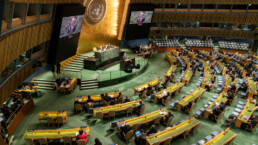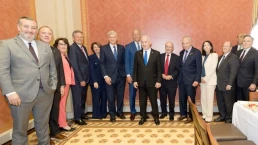The war offers a chance to re-imagine US foreign policy. But first, stopping the rehabilitation of liberal interventionism is key.
by Michael Brenes, Responsible Statecraft
Writing in The Atlantic late last month, journalist George Parker posited a “new theory of American power,” a liberal internationalism that accounted for a “recognition of limits” for US foreign policy. Packer summed up this strategy toward the end of his essay: “Align US policy with the universal desire for freedom, but maintain a keen sense of unintended consequences and no illusions of easy success.”
This was both a challenge and a promise to Americans wanting to move on from the War on Terror: don’t forget the War on Terror’s failures—and reject its methods (torture and rendition)—but maintain a vision of global “freedom” flourishing through military power. The war in Ukraine, Packer argued, had killed the (now fleeting) popularity of “restraint”—the idea that the United States should scale back its international commitments, cut or remake the military budget to reflect a reduced role for the US in the world, and give up on a strategy of what political scientist Barry Posen has called “liberal hegemony.”

As one would imagine, Packer’s essay caused a stir, if not a visceral loathing, among restrainers. But as historian Samuel Moyn tweeted, Packer’s essay—while gilding liberal internationalism for a rehabilitation of American primacy—reflected the reality that the old order cannot return after the War on Terror, “that a militarism-first option of liberal warmongers can’t simply be revived.”
Recent Posts
What To Do When You See ICE In Your Neighborhood
July 14, 2025
Take Action Now How can you deter the Trump administration’s immigrant deportation machine when it pops up in your community? Follow these…
ICE Campaign Of Violence Will Lead To More Deaths
July 14, 2025
Take Action Now Jaime Alanis’s death shows the horrific consequences of a secret police force behaving with utter impunity.By Natasha Lennard, The…
Hague Group: “Concrete Measures” or Sack of Cement? Will It Move to Sanctions, Peace Force and Ensuring Aid to Gaza?
July 13, 2025
Take Action Now Will the meeting in Colombia be a coalescence of global opinion driving states to just action — or just more rhetoric from various…
Why Are Democratic Lawmakers Still Meeting With Netanyahu?
July 12, 2025
Take Action Now Pictures show Democrats like Chuck Schumer standing next to Netanyahu, smiling.By Sharon Zhang, Truthout A bipartisan group of…




